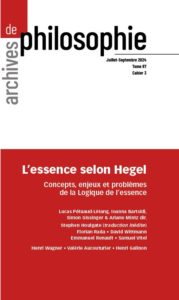 Volume 87, Issue 3, July-September 2024
Volume 87, Issue 3, July-September 2024
Hegel’s Essence
Ioanna Bartsidi  et Simon Gissinger, Forewords
et Simon Gissinger, Forewords
Stephen Houlgate, Essence in Hegel’s Encyclopedia and Science of Logic
In Hegel’s doctrine of essence there is an important difference between the Encyclopedia Logic and the Science of Logic: namely, form, matter and content are considered at different places. If that logic is supposed to be immanent, however, how can it exist in two different versions? I answer that the two texts do not set out alternative logics but present the same logic in different ways. Yet the Science of Logic has priority over the Encyclopedia, because it explains why form and other determinations of ground, which are absent from that section in the Encyclopedia, are logically necessary.
Florian Rada, Contribution to another reading of « diversity » in the Logic of Essence
The concept of form allows us to understand the ontological dimension of Hegel’s Logic. However, the process of determination, which is form, is not yet formally described in Objective Logic; this discrepancy produces singular effects. We propose to give a sample of these effects in the Logic of Being, before focusing on the moment of externalization of form, which occurs in diversity (Verschiedenheit) in the Logic of Essence. There, the relation between form and figure develops itself in a peculiar way, making it possible both to integrate the « formal » logic and to analyze a specific type of objectification: the variable.
David Wittmann, Hegel: From the objectivity of knowledge to the knowledge of concrete objects
We propose to reread the Doctrine of Essence from an epistemological perspective, showing that it deals with the question of the objectivity of knowledge. The three modes of reflection are all ways of addressing the modern problem of knowledge having to justify its objectivity. Hegel will show that the objectivity of knowledge is measured by its ability to think about increasingly concrete forms of objects.
Emmanuel Renault, Some logical and ontological implications of Hegel’s concept of actuality
This article attempts to distinguish between the ontological and logical issues at stake in the Hegelian theory of actuality. First, it clarifies how the Science of Logic « coincides » with ontology, or « replaces » it. Second, it analyzes how Hegel presents the Science of Logic as a whole as a logical theory. In the third step, the contribution of the actuality section to the theory of the truth of thought can then be better understood.
Samuel Vitel, Is someone doing the thinking? Logical subjectivity in Hegel
En partant de la théorie des émotions développée par Mead et Dewey, les aspects centraux de la théorie gestuelle de Mead, qui sous-tend sa théorie de l’émergence de la signification, du langage et de la cognition humaine, seront mis en évidence. En outre, la théorie de Mead s’inscrit dans une perspective socio-biologique sur la naturalisation du langage qui gagne en intérêt aujourd’hui, notamment dans le domaine des théories évolutionnistes du langage et parmi les neuroscientifiques.
* * *
Henri Wagner, Logic, truth, and semantic descent
In this essay, I would like to contribute to an correct understanding of Quine’s use of the truth predicate in the formulation of logical laws. The issue at stake is central: since « logic chases truth up the tree of grammar » by generalizing over sentences instantiating the same logical structure by means of the truth predicate, to commit a misunderstanding on this point is to render oneself unable to adequately understand the internal relation between logic and truth. The method adopted in this essay consists in correcting some widespread confusions about the relation between logic, truth, and semantic ascent.
Valérie Aucouturier, What does it mean to act well according to Elizabeth Anscombe?
Human action and practical truth
“Practical truth,” according to Anscombe, does not merely refer to the capacity of intentional agents to act but to their capacity to act well. As Aristotle put it, it is “truth in accordance with right desire.” Anscombe specifies the point: “Practical truth is the truth brought about in sound deliberation leading to decision and action, and this includes the truth of the description ‘doing well’.” The aim of this paper is to understand the ethical significance of this concept which does not merely address the deliberative structure of intentional action, but the issue of what is a good action, and more precisely what is a good human action: “Practical truth is truth created by action in a sense in which neither branches nor dogs nor children are capable of action.”
Henri Galinon, Putnam’s philosophy of truth: The real, the rational, and the natural
We propose a synthetic review of the evolution of Putnam’s philosophy of truth. Beyond the apparent paradox of his claimed fidelity to a naturalism that he has nonetheless continuously redefined in depth, our reading focuses on the continuity of Putnam’s effort to philosophically articulate the norms that operate within scientific thought, based on a reflection on the reality of representational relations.
